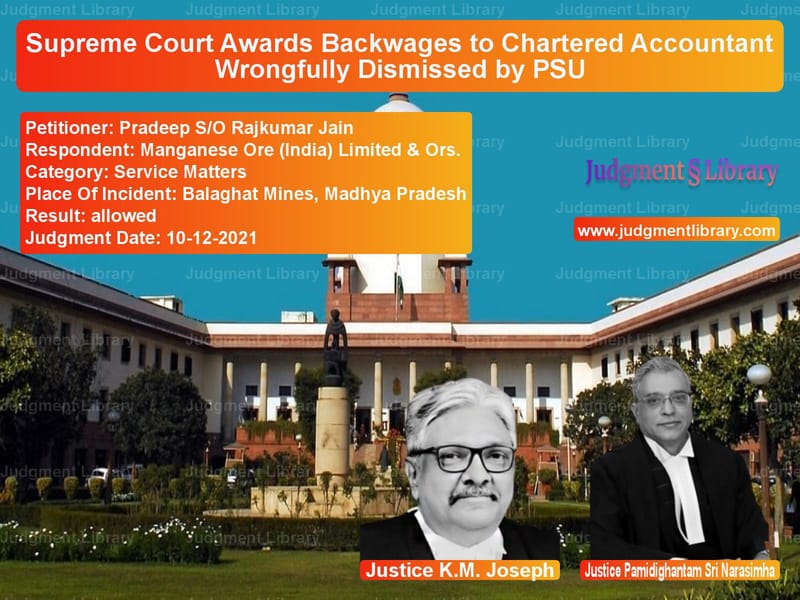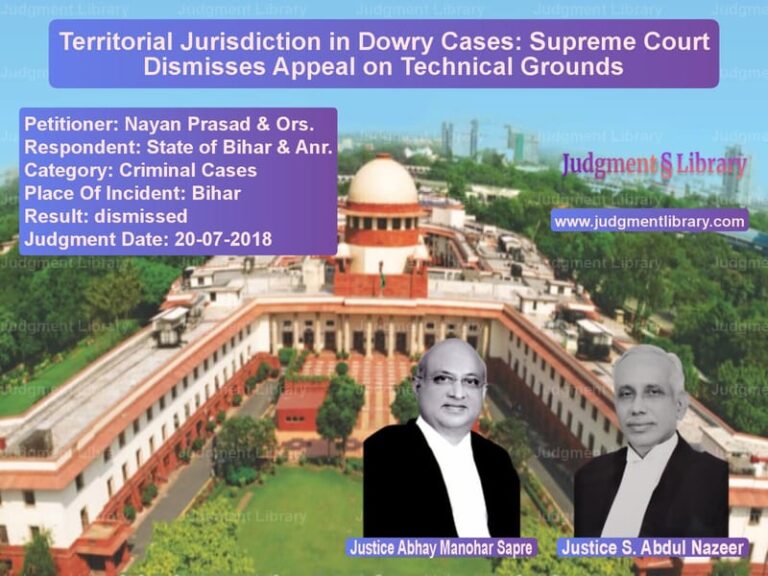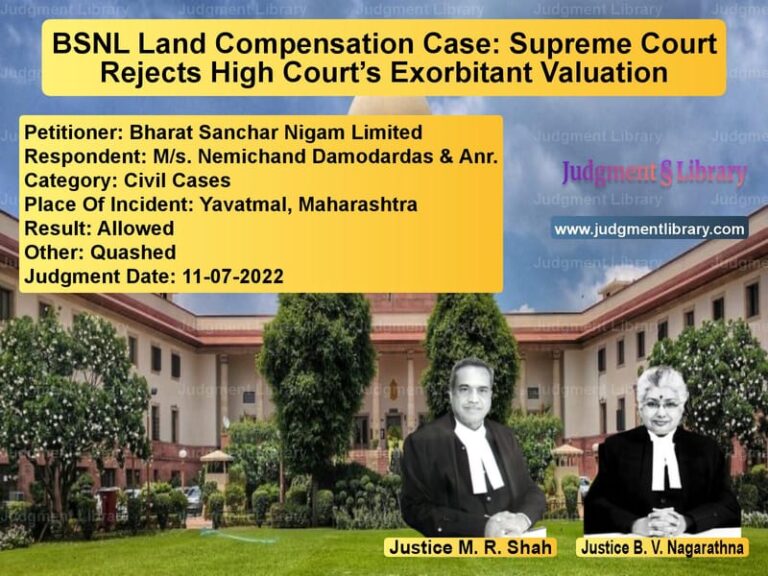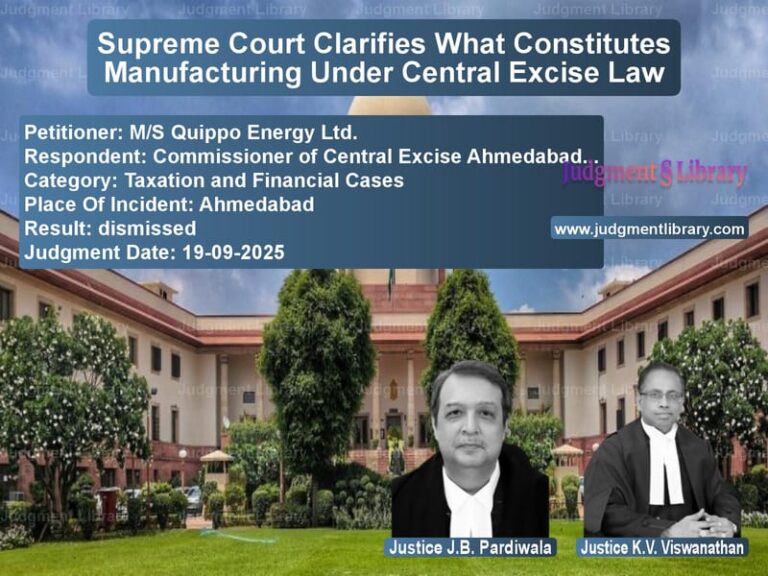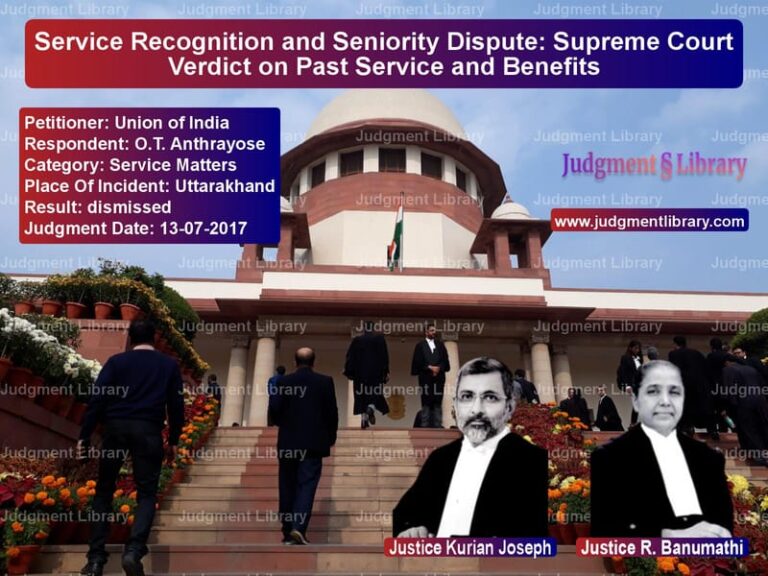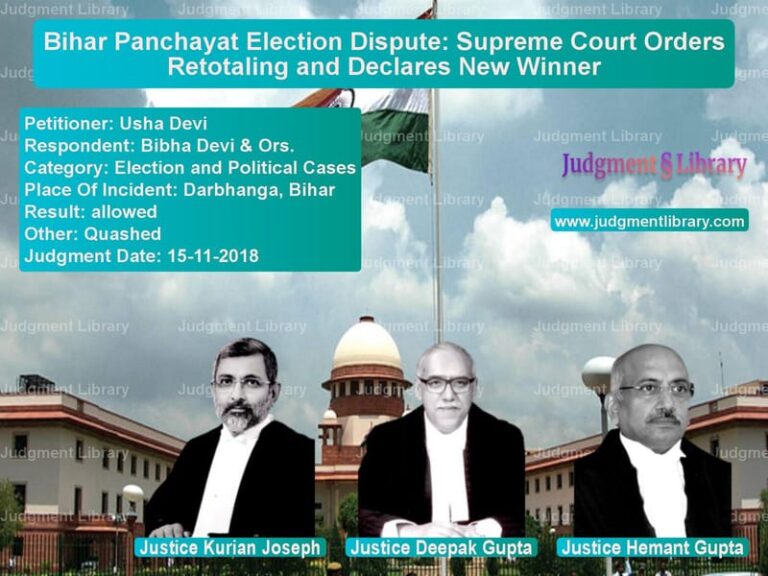Supreme Court Awards Backwages to Chartered Accountant Wrongfully Dismissed by PSU
The case of Pradeep S/O Rajkumar Jain vs. Manganese Ore (India) Limited & Ors. revolves around wrongful dismissal and the subsequent claim for backwages. The Supreme Court had to determine whether a Chartered Accountant, who was dismissed by a Public Sector Undertaking (PSU), should be awarded backwages after being reinstated by the High Court.
Background of the Case
The appellant, Pradeep Rajkumar Jain, was a qualified Chartered Accountant who was appointed as Manager (Finance) at Manganese Ore (India) Limited on October 22, 1997. He was later promoted and posted as Deputy Chief (Finance) at Balaghat Mines in 2005.
In 2007, following the death of his father, Pradeep reported late to work on three occasions. As a result:
- He was served with multiple show-cause notices.
- Despite providing explanations, he was suspended on October 5, 2007.
- On October 27, 2007, he was issued a charge memo.
- Eventually, he was dismissed on August 12, 2008.
Pradeep challenged the dismissal, arguing that it was unjust and lacked any legal basis. His appeal was dismissed, prompting him to file a writ petition in the High Court.
High Court’s Decision
The High Court ruled that Pradeep’s dismissal was wrongful and illegal. It ordered his reinstatement but denied backwages, reasoning that he had not worked during the period of his dismissal.
Issues Before the Supreme Court
- Was the denial of backwages justified despite the wrongful termination?
- Who bears the burden of proof regarding gainful employment during the period of dismissal?
- What quantum of backwages should be awarded?
Arguments by the Parties
Appellant’s Arguments
The appellant argued that:
- The termination was completely unjustified and lacked legal basis.
- He was a victim of corporate victimization by the PSU.
- The High Court had itself ruled that the disciplinary proceedings against him were baseless.
- Since the termination was wrongful, he was entitled to full backwages.
- As a Chartered Accountant, he had earned some income through private work, but it did not equate to his salary at the PSU.
Respondent’s Arguments
The PSU argued that:
- The appellant had earned income during his dismissal period.
- He had filed income tax returns, proving that he was not completely unemployed.
- The burden of proving loss of income was on the appellant.
- The PSU should not be forced to pay full backwages since he had an alternate source of income.
Supreme Court’s Analysis
Burden of Proof in Backwages Cases
The Court referred to previous judgments, including:
- Deepali Gundu Surwase v. Kranti Junior Adhyapak Mahavidyalaya (2013) 10 SCC 324
- Talwara Cooperative Credit and Service Society Ltd. v. Sushil Kumar (2008) 9 SCC 486
The Court reiterated the principle that the burden of proving alternative employment lies on the employer:
“The burden of proof lies on the employer to specifically plead and prove that the employee was gainfully employed and was getting wages equal to the wages he was drawing prior to the termination of service.”
Malicious Termination and Restoring Justice
The Court emphasized that in cases where an employee is wrongfully terminated without cause, denying backwages would unfairly reward the employer’s wrongdoing. It ruled:
“The wrongdoer is the employer, and the sufferer is the employee. There is no justification to give a premium to the employer of his wrongdoings by relieving him of the burden to pay full backwages.”
Quantum of Backwages
The appellant initially sought Rs. 3 crores in backwages but later reduced his claim to Rs. 1.5 crores. The PSU contended that if only basic pay was considered, the amount would be Rs. 66 lakhs.
Taking into account all factors, the Supreme Court ruled that:
- The appellant was entitled to Rs. 80 lakhs in backwages.
- The amount should be paid within six weeks.
- Failure to pay within the stipulated time would attract interest.
Key Takeaways from the Judgment
- Wrongful termination entitles the employee to backwages: If a termination is found to be illegal, the employer cannot deny backwages.
- Burden of proof lies on the employer: If the employer claims the employee was earning during dismissal, it must provide clear evidence.
- Partial earnings do not nullify backwages: Even if an employee earns during dismissal, they may still receive backwages unless they earned an equivalent salary.
- Quantum of backwages depends on circumstances: Courts may award full or partial backwages based on case-specific factors.
- PSUs must exercise disciplinary action fairly: Government enterprises should ensure that disciplinary proceedings are not arbitrary or unjust.
Final Judgment
The Supreme Court ruled in favor of the appellant and modified the High Court’s order to grant Rs. 80 lakhs in backwages. The PSU was directed to make the payment within six weeks.
Conclusion
This judgment reaffirms the fundamental principle that employers cannot arbitrarily dismiss employees and escape liability. It upholds the rights of employees who suffer wrongful termination, ensuring that they are fairly compensated for their lost income. The ruling is significant in protecting workers in both private and public sectors from unfair labor practices.
Petitioner Name: Pradeep S/O Rajkumar Jain.Respondent Name: Manganese Ore (India) Limited & Ors..Judgment By: Justice K.M. Joseph, Justice Pamidighantam Sri Narasimha.Place Of Incident: Balaghat Mines, Madhya Pradesh.Judgment Date: 10-12-2021.
Don’t miss out on the full details! Download the complete judgment in PDF format below and gain valuable insights instantly!
Download Judgment: pradeep-so-rajkumar-vs-manganese-ore-(india-supreme-court-of-india-judgment-dated-10-12-2021.pdf
Directly Download Judgment: Directly download this Judgment
See all petitions in Employment Disputes
See all petitions in Termination Cases
See all petitions in Public Sector Employees
See all petitions in Judgment by K.M. Joseph
See all petitions in Judgment by P.S. Narasimha
See all petitions in allowed
See all petitions in supreme court of India judgments December 2021
See all petitions in 2021 judgments
See all posts in Service Matters Category
See all allowed petitions in Service Matters Category
See all Dismissed petitions in Service Matters Category
See all partially allowed petitions in Service Matters Category

